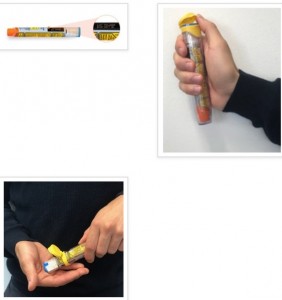Patients need to check their device to confirm that it can be removed from the carrier tube with ease.
Pfizer Canada has advised Health Canada that, in a very small number of cases, some EpiPen (0.3 mg) and EpiPen Jr (0.15 mg) auto-injector devices may not slide out of their carrier tube easily, or at all. This could delay or prevent emergency treatment, possibly leading to patient disability or death.
According to the company, the device label has been improperly applied to a very small number of devices in a way that the device label may become stuck to the inside of the carrier tube. This could mean that the device does not slide out of the tube as easily as expected. The issue is with the device label, and not with the device itself or the drug that it delivers (epinephrine).
EpiPen and EpiPen Jr are used to deliver an emergency treatment of adrenaline (epinephrine) to patients who are at risk or have a history of life-threatening allergic reactions (anaphylaxis). Products are not being recalled by Pfizer, as the risk can be mitigated easily by pharmacists and patients by checking devices before an emergency situation arises to make sure they slide easily out of their carrier tube.
According to the company, there have been no reports of malfunctions related to this issue in Canada. Health Canada is reminding Canadians of the ongoing supply disruptions of EpiPen and EpiPen Jr auto-injectors and that an alternative product, Auvi-Q (0.3 mg and 0.15 mg), has been made available through an Interim Order.
Products affected
- EpiPen (0.3 mg) (DIN 00509558) products that expire between April 2018 and October 2019.
- EpiPen Jr (0.15 mg) (DIN 00578657) products that expire between April 2018 and October 2019.
Pfizer Canada is advising consumers to check if their devices expire between April 2018 and October 2019 and, if so, to do the following:
- Check devices to make sure they slide out easily from their carrier tube. To check the device, flip open the carrier tube cap, gently turn the tube upside down and let the device slide out into your hand (do not shake or drop it). Visually inspect your device to make sure the device label has no unglued edges that may catch on the tube.
- Do NOT remove the blue safety release from the auto-injector device. The blue safety release should be kept on the auto-injector until the time of use.
- Return the EpiPen device to its carrier tube and close the carrier tube flip cap once you have confirmed that your device slides out easily and that the device label has no unglued edges.
- If you are unsure about how to check your device, your pharmacist can check your device for you.
- If your device sticks or does not slide out easily from its tube, or the device label has unglued edges, return it to your pharmacist for replacement. Do NOT attempt to remove or re-attach the label under any circumstances.
- Report adverse events to health products to Health Canada by calling toll-free at 1-866-234-2345, or by reporting online, by mail or by fax.
- Report complaints about health products to Health Canada by calling toll-free at 1-800-267-9675, or complete an online complaint form.
.
Source : Media Release




